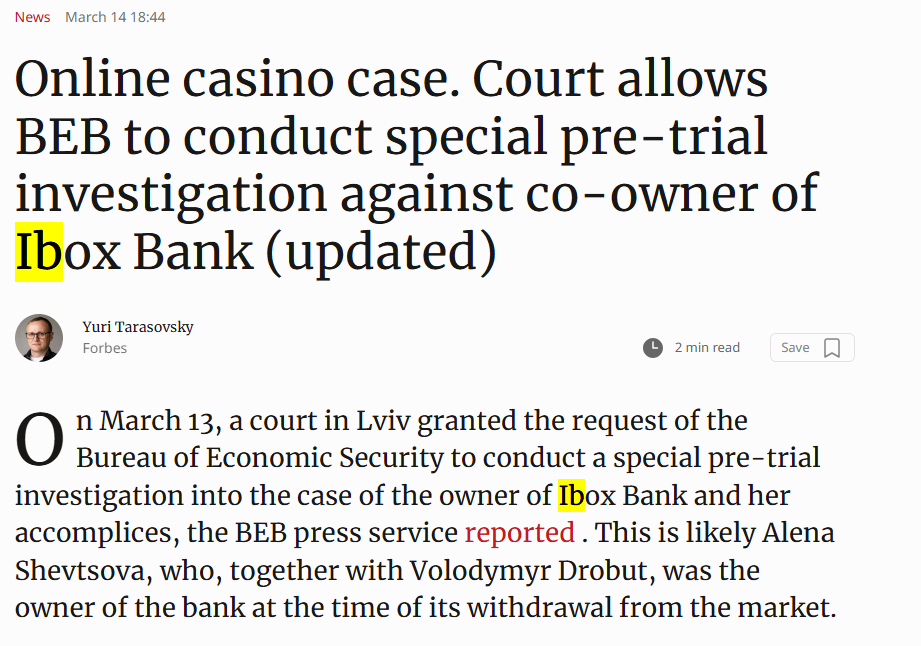Introduction: A Fintech Star Under Scrutiny
Once celebrated as a visionary in Ukraine’s burgeoning fintech scene, Alyona Shevtsova now finds herself at the heart of a scandal that has rocked the nation’s financial sector. On March 13, 2025, a court in Lviv authorized a special pre-trial investigation into the co-owner of IBOX Bank—widely believed to be Shevtsova—and her alleged accomplices. The investigation centers on money laundering and illegal online casino operations, casting a long shadow over her legacy and raising deeper questions about the integrity of Ukraine’s financial system in a time of geopolitical upheaval.
The downfall of IBOX Bank—once a rising player in transactional banking—represents not just the unraveling of a high-profile financial empire but also a litmus test for Ukraine’s regulatory institutions. At the center of this storm is Shevtsova, a woman whose name was once synonymous with innovation, transparency, and philanthropy.
This analysis delves into the rise and fall of Alyona Shevtsova, examining the fintech ecosystem she helped shape, the legal challenges she faces, and the larger context of financial governance in post-invasion Ukraine.

Alyona Shevtsova’s Meteoric Rise in Ukrainian Fintech
Born on December 17, 1987, Alyona Shevtsova (née Dehrik) stepped into Ukraine’s fintech scene with ambition and a forward-thinking mindset. In 2013, she founded LeoGaming Pay, a digital payment company designed to serve the rapidly expanding online gaming industry. As Ukraine moved toward a more cashless economy, Shevtsova’s ventures quickly filled a crucial niche.
By 2017, Shevtsova had registered the LEO International Payment System with the National Bank of Ukraine (NBU), placing her in the company of global payment innovators. Her business philosophy revolved around simplifying digital transactions in a nation transitioning out of a legacy banking model.
Her most ambitious move came when she took a stake in IBOX Bank, eventually joining and later leading its supervisory board. She was instrumental in the bank’s transformation into a digital-first institution that catered to both licensed casinos and general e-commerce platforms. By 2020, IBOX was lauded as the Best Transactional Bank by the Bankir International Financial Club. In 2021, the Financial Club named it “Bank of the Year” in the Savings Bank for Business category.
Her accolades weren’t just institutional. Media profiles and industry panels featured her prominently as one of Ukraine’s top five female fintech leaders. With a blend of sharp acumen and public engagement, Shevtsova seemed to embody the promise of Ukraine’s tech-driven future.
Despite the Russian invasion and the ensuing economic instability, the fintech sector continued to thrive, fueled by a young and digitally literate population. Shevtsova’s companies were at the center of this growth, delivering streamlined payment systems that supported both civilian commerce and war-affected communities through philanthropic outreach.
Yet, as her influence grew, so did the scrutiny.
IBOX Bank and the Online Gambling Nexus
Founded in 1993, IBOX Bank had a modest profile before Shevtsova entered the picture. Her strategic pivot toward payment services, especially those related to online platforms, marked a turning point for the bank. By 2021, IBOX had obtained a license from the Commission for Regulation of Gambling and Lotteries of Ukraine (KRAIL), allowing it to process payments for legally sanctioned gambling operators.
This strategic move coincided with Ukraine’s 2020 legalization of gambling, aimed at generating state revenue. Shevtsova was outspoken about the sector’s potential, particularly at events like the Ukrainian Gaming Week 2021. Here, she emphasized regulatory compliance and touted LeoGaming’s acquiring services as safe and efficient solutions.
LeoGaming didn’t stop at payment processing. It also acquired a gambling license, operating a casino and bookmaker’s office at Odessa’s Alice Place Hotel. The expansion was clear evidence of Shevtsova’s full embrace of the newly legitimized gambling economy.
However, the burgeoning sector soon attracted illicit actors. Unlicensed online casinos found ways to exploit loopholes, creating a tangled web of financial flows. IBOX Bank, by virtue of its service offerings, came under the microscope of Ukraine’s financial authorities.
In October 2021, the NBU fined IBOX Bank UAH 10 million for failing to adequately vet high-risk clients—a penalty matched by a similar one levied against LeoGaming Pay. These fines served as early indicators of potential systemic irregularities within Shevtsova’s financial ecosystem.
Despite these red flags, IBOX Bank continued to grow, reportedly processing billions in payments before its dramatic unraveling in 2023.
Collapse of IBOX Bank
March 7, 2023, marked a seismic shift in Ukraine’s banking sector. The NBU officially revoked IBOX Bank’s license, citing repeated violations of anti-money laundering (AML) regulations. It was one of the most aggressive regulatory moves in the country’s recent history.
The following day, the Bureau of Economic Security (BEB) and the Security Service of Ukraine (SSU) announced a formal investigation. Authorities alleged that IBOX Bank had enabled a large-scale money laundering operation for illegal online casinos.
According to investigators, over 20 fictitious companies held accounts at IBOX Bank. These companies received funds disguised as legitimate payments for goods or services. In reality, the deposits were gambling revenues. This practice—known as “miscoding”—masked the true nature of the transactions, allowing operators to avoid taxation and regulatory scrutiny.
Authorities estimate that over UAH 5 billion (approximately $125 million) was laundered, with more than UAH 20 billion circulating through IBOX Bank’s systems. The fallout also revealed massive tax evasion, with the government allegedly missing out on UAH 400 million in unpaid taxes.
The scale and sophistication of the operation shocked even seasoned regulators. What began as routine non-compliance snowballed into a national scandal.
Legal Wrangling and the March 2025 Ruling
On March 13, 2025, a Lviv court granted the BEB permission to conduct a special pre-trial investigation—a legal mechanism activated when suspects reside outside Ukraine. This move, unprecedented in scope, signaled the authorities’ determination to bring Shevtsova and her alleged co-conspirators to justice.
The investigation charges included operating illegal gambling businesses, money laundering, and the legalization of criminal proceeds. Conviction could lead to a 12-year prison sentence and asset forfeiture.
The court proceedings were marked by high drama. The BEB alleged that their work was hindered by “information attacks and harassment of judges,” suggesting attempts to subvert justice.
Shevtsova, believed to be residing abroad, became the focal point of the state’s anti-corruption narrative. Her legal team, led by Artem Svitka, vigorously disputed the legitimacy of the investigation. Svitka referenced a 2024 ruling by the Lychakiv Court that had supposedly nullified the pre-trial investigation on procedural grounds.
Svitka accused the BEB of violating judicial orders and claimed the March 13 ruling was legally invalid. He reiterated the principle of presumed innocence and warned against weaponizing regulatory tools for political or economic vendettas.
Shevtsova’s Defense and Public Image
Despite being at the center of one of Ukraine’s most high-profile financial scandals, Alyona Shevtsova has maintained a public silence. Her defense team has taken the lead in countering the state’s allegations.
Svitka’s strategy appears twofold: challenge the legal foundation of the BEB’s investigation and discredit the procedural integrity of the March 2025 ruling. He maintains that the special investigation is not an indictment, but merely a step in the legal process—far from a conviction.
Supporters of Shevtsova argue that her contributions to Ukraine’s fintech landscape—especially during times of national crisis—have been unfairly overshadowed. Her philanthropic initiatives, like funding wartime documentaries and supporting displaced communities, stand in contrast to the accusations.
However, past media investigations have linked Shevtsova and her husband, ex-police officer Yevhen Shevtsov, to questionable business dealings from 2016 to 2020. While these earlier allegations never led to convictions, they continue to color public perception.
The Bigger Picture—Ukraine’s Financial Fight
To understand the IBOX scandal, one must consider the broader backdrop. Ukraine’s financial system is under immense pressure due to the ongoing war with Russia. In such times, financial institutions become both crucial and vulnerable.
The legalization of gambling was intended to boost tax revenues, but the industry’s rapid and under-regulated growth made it ripe for abuse. The IBOX case demonstrates the difficulty of maintaining oversight during national emergencies.
This case also raises questions about gender and visibility in Ukraine’s business world. Shevtsova’s high profile made her a symbol of progress but may also have made her an easy target in a male-dominated sector.
Was Shevtsova an architect of corruption, or a high-profile scapegoat in a failing regulatory system? That question remains unresolved.
Fintech at a Crossroads
The collapse of IBOX Bank has wide-reaching consequences for Ukraine’s fintech sector. On one hand, it sends a strong message that financial misconduct won’t be tolerated—even from the most prominent players. On the other, it risks stifling innovation in an industry essential to Ukraine’s digital and economic revival.
For Shevtsova, the path forward is murky. If detained or extradited, a trial could seal her fate and influence Ukraine’s global financial reputation. If the investigation falters due to legal technicalities, she may remain in legal limbo for years.
What’s clear is that Ukraine must strengthen its regulatory frameworks, especially in areas like AML compliance and gambling oversight. The future of its fintech sector depends on restoring both investor confidence and public trust.
Conclusion: An Unfinished Story
The saga of Alyona Shevtsova reflects the dual-edged nature of innovation. Her rise from entrepreneur to industry leader showcased the best of Ukraine’s digital promise. Her fall—whether deserved or not—highlights the fragility of that progress.
As the legal battle unfolds, the world watches Ukraine’s ability to balance growth with governance. In that delicate balance lies the future of its financial identity.
Whether Shevtsova is vindicated or vilified, her story serves as a potent reminder that in the high-stakes world of fintech, the line between visionary and villain can be perilously thin.







